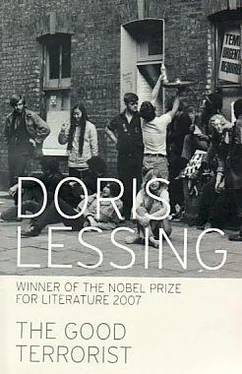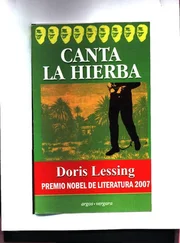The storm went on, and she heard her name being called from below: "Alice, Alice, what's wrong?"
"Bloody filthy accumulating middle-class creeps" - and papers, jars, boots, rags went hurtling through the trap around Mary and Reggie.
"What is wrong, can we help?"
She saw the two agitated, concerned faces, responsible citizens, turned upwards, side by side, illuminated by her jerking, wavering torch, and suddenly she laughed. She stood above them and staggered about, laughing.
"Oh, Alice," cried Mary, "Oh, Alice," squealed Reggie, and they sounded admonishing, petulant, reproachful, and Alice fell, rolled to the trap-door edge, caught its edges with her strong hands, swung herself down, to land on her feet by Mary, by Reggie, laughing and pointing at them, "If you could see yourselves, if you could just see..."
And she staggered and hooted among the sordid piles, and kicked shoes and clothes around. Broken glass scattered.
Mary and Reggie looked at each other, at her, and went hastily into their bedroom. The sound of that door closing, polite and restrained despite everything, made Alice laugh again. She collapsed on the floor, among all the rubbish, laughed herself out to silence, and looked up into the trap, to see the torchlight shining there. It showed the slanting beams of the roof, it showed the two rotten beams, which even down here and in this light looked cheesy.
She climbed up again and, refusing to look at the dangerous beams, began soberly to close the trunks, tidy up a little. Was she really going to clear everything out of here? For what? For whom?
She put out the light, leaving it exactly where it had been, for Philip. She left the attic, by the ladder this time, and then kicked all the junk into a great heap along the banisters. She was making a frightful noise, but what of it. Do them good, she was thinking. One day Mary and Reggie will say, Yes, we did try living in a commune, we gave it a fair trial, but we are afraid...
She was shaking with laughter again. She went downstairs, yelling, sobbing with mirth. If mirth it was: she heard these sad wails and thought, I'm laughing out of the wrong side of my mouth....
At three in the morning, she went forlornly to bed, promising herself to get at least one room painted tomorrow. This one, perhaps. She knew Jasper would be pleased, even if he did seem to jeer. With her mind on Jasper, what he was doing, with whom, she slept fitfully, rose many hours before anyone else was likely to, cleared the room of the little that was in it, fetched up Philip's trestles and the paints and rollers, rubbed over ceilings and walls with a duster tied around the head of a broom, swept off the floor the resulting films of dust. It was still only seven o'clock.
Sitting by herself in the kitchen with coffee, looking at the golden forsythia, she was aglow with health, energy, accomplishment. If Jasper had been here, she could not have done this, she would have had to adapt her pace to his.... Sometimes, very seldom, the thought came into her head: If I were alone, if I did not have Jasper to worry about... Rarely, and this was one of the times, she knew she was tied to him by what seemed like a tight cord of anxiety that vibrated to his needs, never hers; she knew how she was afflicted by him, how he weighed her down. Supposing she left him? (For he would never leave her!) If she found a place of her own, with other comrades, of course - why, she had moved so often, it was nothing, she could do it easily. Without Jasper. She sat quietly, her freckled girl's hand just encompassing the big brown mug, as though it had alighted there, her eyes held by the blessed, blissful forsythia that filled the whole kitchen with energy, with pleasure. Without Jasper. She began to make uneasy, restless little movements, and her breathing became faster, then slowed to a sigh. How could she live without Jasper? It was true, what people said: they were like brother and sister. But supposing... The thought of another man made her give an incredulous little shake of the head. Not that plenty hadn't come near, to ask, Why Jasper, why not me? Had said, But he doesn't give you anything.
But he did; he did! How could she leave him?
She got up slowly from the table, washed up the mug, and stood for some time absolutely still, staring. She thought: I keep forgetting that time is going on. She was over thirty. Well over thirty, in her mid-thirties... Thirty-six, actually. If she was going to have a child, ever... No, no; real responsible revolutionaries should not have children. (But they did!)
She flung the whole tangle of thought away from her and ran fast up the stairs, as though in the room some delight or pleasure awaited her, not the hard task of painting.
She worked steadily on, until she had finished the first coat. Ceilings and walls were all fresh white where dirt and dinginess had been. Some people would leave it at that, but not Alice: there would be a second coat. She strode through the newspapers all over the floor, some of them with dates from the thirties, even the war. "Second Front!" in big black print slid away under another sheet, and "Attlee Promises..." She was not interested in what Attlee or anyone else had promised. Again in the kitchen, she rested herself, and thought: I'll have finished our room by midday, I could do another. Well, I'd need help for the sitting room. The worst is the girls' room, Faye and Roberta's. I'll just have a quick look now....
She was sure they had not come in, but knocked to make sure.
Silence. She went in and, because her eyes were on ceilings and v. alls, did not realise at once that they were, after all, there, two low huddling mounds under blankets, shawls, and all kinds of bits and pieces of stuffs, mostly flowered. Roberta, disturbed but not knowing why, had stretched up arms to yawn, then sat up, womanly breasts lolling, and she stared with displeasure at Alice. Who said, "Sorry, I thought you were out."
"Well, we are not!" But the look of dislike, which Alice was afraid might be what Roberta did feel for her, was replaced with Roberta's more amiable look, and she sat up, feeling for cigarettes. From the tense look of the bundle that was Faye, Alice knew she was awake. She explained reasonably, "I am painting our room. I'll have finished in a couple of hours. I thought I could do yours today, if you like."
At this Faye sat up, flinging aside covers, in one movement, like a swimmer surfacing, and she glared at Alice as she had at poor Monica.
"No," she said, in a deadly, cold voice. "You will not paint this room, Alice. You will not. You will leave us alone."
"Faye," said Roberta quietly. "It's all right."
"No, it's not all right," shrilled Faye. "You paint your own fucking room, Alice. Just keep your shitty little hands off us, do you hear?"
Alice, well used to such situations, was standing her ground, was not hurt, or offended, or any of the things she knew Faye wanted her to be. She was thinking: Full marks to Roberta. Just imagine, having to cope with Faye all the time.
"It's all right, Faye," said Alice. "Well, of course, I won't if you don't want. But the room is pretty far gone, isn't it?" And she looked with interest at the walls, which, in the strong morning light - the sun was only just leaving one of them - seemed that they might start sprouting mushrooms.
They sat there side by side, Faye and Roberta, staring at Alice, so unlike Mary and Reggie that Alice was even amused - inside, of course, not letting it show. And her heart hurt for the girls. Mary and Reggie - those householders, as Alice contemptuously thought of them - sitting upright in their marriage bed, examining Alice, knew that nothing could ever really threaten them. But Roberta, for all her handsome, dark solidity, her motherliness, and Faye, like a flimsy chick or little bird huddling there behind Roberta's large shoulder, were vulnerable. They knew that anything, even Alice, could advance over them like bulldozers, crush them to bits.
Читать дальше











